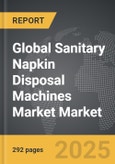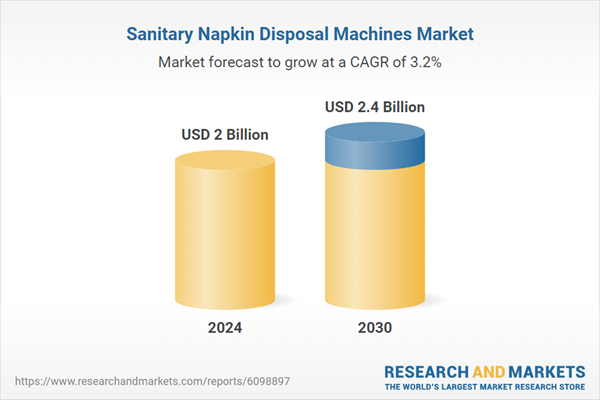Global 'Sanitary Napkin Disposal Machines' Market - Key Trends & Drivers Summarized
Why Are Sanitary Napkin Disposal Machines Becoming a Public Health Imperative?
Sanitary napkin disposal machines are rapidly transitioning from luxury installations to public health necessities, especially in educational institutions, workplaces, and public restrooms. The improper disposal of menstrual waste leads to sanitation issues, environmental degradation, and social stigma. These machines address a crucial gap in menstrual hygiene management (MHM) by providing a safe, discreet, and eco-friendly disposal method. They are particularly vital in developing countries, where waste infrastructure is lacking, and cultural taboos often inhibit open discussions on menstrual hygiene. Burn-type disposal machines that operate at high temperatures eliminate pathogens and reduce volume, making them suitable for high-traffic areas. The machines play a key role in school retention for adolescent girls, many of whom drop out due to a lack of hygienic facilities. Governments and NGOs are increasingly incorporating sanitary disposal systems in menstrual health policies. Their presence also aligns with global SDG targets related to health, sanitation, and gender equality. As awareness spreads, these machines are becoming an integral part of inclusive, gender-sensitive infrastructure planning.What Technological Advances Are Revolutionizing Disposal Machine Design?
The latest generation of sanitary napkin disposal machines features a blend of automation, energy efficiency, and safety enhancements. Fully automatic units with infrared sensors allow contactless operation, ensuring hygiene. Machines are being designed with temperature-controlled incineration chambers, dual filtration systems to reduce emissions, and ash collectors for easy cleaning. Battery-operated and solar-powered models are gaining traction in off-grid areas and sustainability-conscious installations. IoT-enabled models are being piloted in smart campuses and hospitals, offering features like fill-level detection, remote monitoring, and usage analytics. Compact wall-mounted designs are optimizing space utilization in urban restrooms. Anti-microbial coatings and fire-retardant materials are being used to ensure long-term user safety. Manufacturers are also focusing on low-maintenance components and modularity for ease of repair and upgrades. Such innovations are not only addressing functional requirements but also making the machines more acceptable in mainstream architecture.How Are Policy Shifts and Public Demand Driving Installation Rates?
Policy-level changes and public advocacy are dramatically increasing the installation of sanitary napkin disposal machines. National and state-level hygiene programs in countries like India, Bangladesh, and Kenya now mandate sanitary disposal solutions in schools and government buildings. CSR initiatives from corporations are funding machine deployment in underserved communities. Consumer demand is rising in urban areas where women expect such amenities in shopping malls, offices, airports, and transit hubs. Social media campaigns and influencer-led movements have helped normalize conversations around menstruation, indirectly boosting acceptance of disposal systems. Local municipalities are integrating these machines into waste management frameworks, ensuring they are maintained and serviced regularly. Furthermore, public tenders and procurement guidelines are beginning to include disposal machines as a standard line item, accelerating market penetration. As menstrual equity becomes a widely recognized policy goal, installation of these machines is being seen not just as a hygiene solution, but as a basic right.The Growth In The Sanitary Napkin Disposal Machines Market Is Driven By Several Factors...
Several compelling factors are driving growth in this sector. Rising awareness of menstrual hygiene, both at grassroots and institutional levels, is a foundational driver. Regulatory mandates for menstrual waste disposal in public and private buildings are rapidly increasing. Technological advancements such as touch-free incineration and IoT connectivity are making these machines more user-friendly and scalable. The increasing integration of MHM in school curricula and health education programs is also creating demand in educational institutions. Urban infrastructure development, particularly in smart cities, includes menstrual hygiene devices as part of inclusive design mandates. Philanthropic and NGO-backed distribution programs are further accelerating adoption in low-income areas. Environmental regulations on menstrual waste disposal are encouraging the use of ash-producing incinerators over conventional bins. Additionally, the rise of sustainable menstruation practices is pushing manufacturers to develop machines compatible with biodegradable and reusable products. These cumulative drivers reflect a broader cultural and infrastructural shift toward prioritizing menstrual hygiene as a central tenet of public health and urban planning.
Report Scope
The report analyzes the Sanitary Napkin Disposal Machines market, presented in terms of market value (US$). The analysis covers the key segments and geographic regions outlined below:- Segments: Capacity (Up to 50 Napkins, 50 - 100 Napkins, 100 - 200 Napkins, 200 - 400 Napkins, Above 400 Napkins); Application (Schools & Colleges Application, Hostels Application, Offices Application, Hospitals Application, Shopping Malls Application, Hotels & Restaurants Application, Other Applications).
- Geographic Regions/Countries: World; United States; Canada; Japan; China; Europe (France; Germany; Italy; United Kingdom; Spain; Russia; and Rest of Europe); Asia-Pacific (Australia; India; South Korea; and Rest of Asia-Pacific); Latin America (Argentina; Brazil; Mexico; and Rest of Latin America); Middle East (Iran; Israel; Saudi Arabia; United Arab Emirates; and Rest of Middle East); and Africa.
Key Insights:
- Market Growth: Understand the significant growth trajectory of the Up to 50 Napkins Capacity Disposal Machines segment, which is expected to reach US$1.2 Billion by 2030 with a CAGR of a 3.9%. The 50 - 100 Napkins Capacity Disposal Machines segment is also set to grow at 2% CAGR over the analysis period.
- Regional Analysis: Gain insights into the U.S. market, valued at $550.8 Million in 2024, and China, forecasted to grow at an impressive 6.2% CAGR to reach $486.3 Million by 2030. Discover growth trends in other key regions, including Japan, Canada, Germany, and the Asia-Pacific.
Why You Should Buy This Report:
- Detailed Market Analysis: Access a thorough analysis of the Global Sanitary Napkin Disposal Machines Market, covering all major geographic regions and market segments.
- Competitive Insights: Get an overview of the competitive landscape, including the market presence of major players across different geographies.
- Future Trends and Drivers: Understand the key trends and drivers shaping the future of the Global Sanitary Napkin Disposal Machines Market.
- Actionable Insights: Benefit from actionable insights that can help you identify new revenue opportunities and make strategic business decisions.
Key Questions Answered:
- How is the Global Sanitary Napkin Disposal Machines Market expected to evolve by 2030?
- What are the main drivers and restraints affecting the market?
- Which market segments will grow the most over the forecast period?
- How will market shares for different regions and segments change by 2030?
- Who are the leading players in the market, and what are their prospects?
Report Features:
- Comprehensive Market Data: Independent analysis of annual sales and market forecasts in US$ Million from 2024 to 2030.
- In-Depth Regional Analysis: Detailed insights into key markets, including the U.S., China, Japan, Canada, Europe, Asia-Pacific, Latin America, Middle East, and Africa.
- Company Profiles: Coverage of players such as AAT Bioquest, Azenta Life Sciences (GENEWIZ), BaseClear, BGI Genomics, Eurofins Genomics and more.
- Complimentary Updates: Receive free report updates for one year to keep you informed of the latest market developments.
Some of the 37 companies featured in this Sanitary Napkin Disposal Machines market report include:
- Adroit Molecules
- American Specialties, Inc.
- Bionics Scientific Technologies
- Doha Systems Pvt. Ltd.
- Elevate Info System
- Euronics Industries Pvt. Ltd.
- HLL Lifecare Limited
- HygienenYou (Rram Business Corp)
- KCS Solutions
- Ojo Technologies Pvt. Ltd.
- Ontrack Enterprises
- Pragati Enterprises
- Riya Inc.
- Saptam Corporation
- Sara Equipments
- Secure Vending Systems
- Sneha Industries
- Sri Adhava Power Industries
- Tendril Products
- Yarra Industries Pvt. Ltd.
This edition integrates the latest global trade and economic shifts into comprehensive market analysis. Key updates include:
- Tariff and Trade Impact: Insights into global tariff negotiations across 180+ countries, with analysis of supply chain turbulence, sourcing disruptions, and geographic realignment. Special focus on 2025 as a pivotal year for trade tensions, including updated perspectives on the Trump-era tariffs.
- Adjusted Forecasts and Analytics: Revised global and regional market forecasts through 2030, incorporating tariff effects, economic uncertainty, and structural changes in globalization. Includes historical analysis from 2015 to 2023.
- Strategic Market Dynamics: Evaluation of revised market prospects, regional outlooks, and key economic indicators such as population and urbanization trends.
- Innovation & Technology Trends: Latest developments in product and process innovation, emerging technologies, and key industry drivers shaping the competitive landscape.
- Competitive Intelligence: Updated global market share estimates for 2025, competitive positioning of major players (Strong/Active/Niche/Trivial), and refined focus on leading global brands and core players.
- Expert Insight & Commentary: Strategic analysis from economists, trade experts, and domain specialists to contextualize market shifts and identify emerging opportunities.
Table of Contents
Companies Mentioned (Partial List)
A selection of companies mentioned in this report includes, but is not limited to:
- Adroit Molecules
- American Specialties, Inc.
- Bionics Scientific Technologies
- Doha Systems Pvt. Ltd.
- Elevate Info System
- Euronics Industries Pvt. Ltd.
- HLL Lifecare Limited
- HygienenYou (Rram Business Corp)
- KCS Solutions
- Ojo Technologies Pvt. Ltd.
- Ontrack Enterprises
- Pragati Enterprises
- Riya Inc.
- Saptam Corporation
- Sara Equipments
- Secure Vending Systems
- Sneha Industries
- Sri Adhava Power Industries
- Tendril Products
- Yarra Industries Pvt. Ltd.
Table Information
| Report Attribute | Details |
|---|---|
| No. of Pages | 292 |
| Published | February 2026 |
| Forecast Period | 2024 - 2030 |
| Estimated Market Value ( USD | $ 2 Billion |
| Forecasted Market Value ( USD | $ 2.4 Billion |
| Compound Annual Growth Rate | 3.2% |
| Regions Covered | Global |









